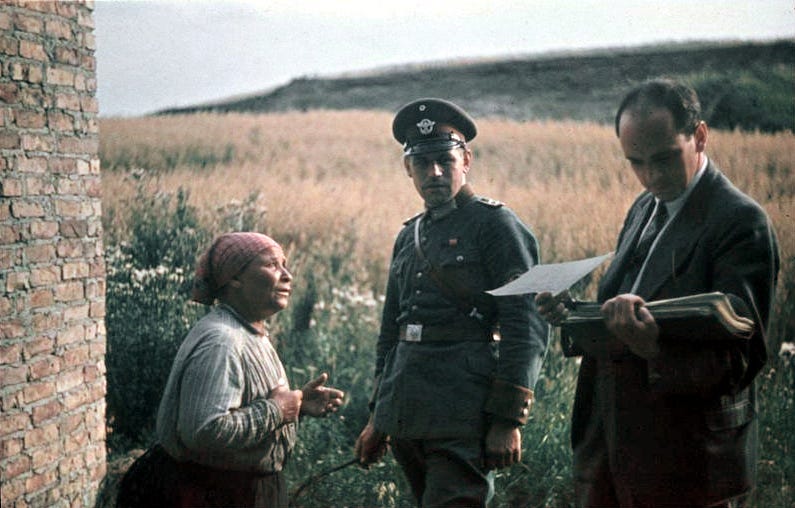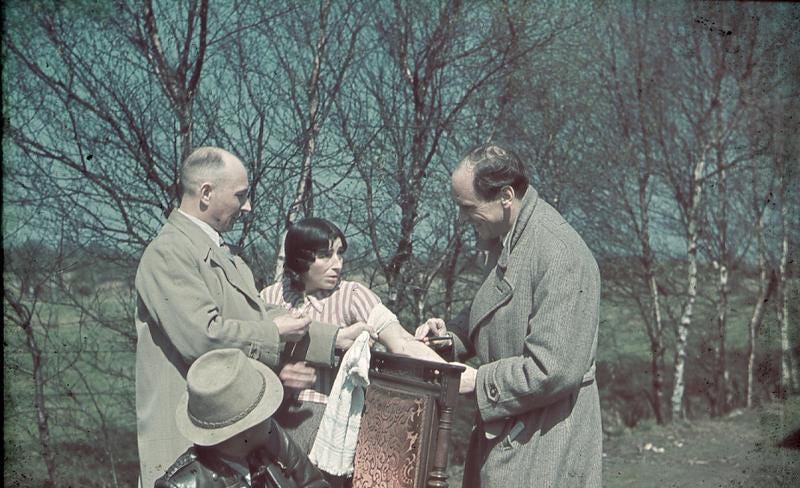'Hitler's Housewives' has many revealing stories about life on the home front in Germany.
Tim Heath began his military research focusing on the WWII air war and the Luftwaffe. HIs researches brought him into contact with many German families, often through the the German War Graves Commission. In turn he learnt a great deal about the war as experienced by those on the home front, mainly women who were young at the time.
Hitler's Housewives takes a journey through the course of the war through the eyes of a variety of women. They come from their diaries and memoirs combined with some more recent interviews. The women involved have been very candid with Heath, sometimes revealing some surprisingly intimate details. A picture emerges of life under the Nazis as they see men go off to war, then begin to see relatives and loved ones reported killed, then the threat becomes more direct as the bombing starts … and the experience generally just gets worse right through to the Soviet occupation.
Sometimes these personal experiences speak volumes about what life was like under the Nazis.
The innocent intentions of 9 year old Lisa Schauer, living near Munich, had appalling consequences when they came into conflict with state sponsored murderous prejudice:
I spent lots of time at my grandparents as I loved them dearly. I used to stay and sleep at their home any time I could. I loved their home as everything was so old. They had a huge open fire, lots of old brassware and old wooden beams ran across the ceilings of every room in their house. Their garden was beautiful in summer. It was packed with fragrant flowers. Both my grandparents loved their garden as many old people did and still do.
One thing I can vividly recall of our lives [...] was the gypsy people who often came by our grandparent’s home. I always found them slightly scary and my grandmother used to warn me that if they came I should run inside. As a younger child, this caused me to question why I should do this. My grandmother would tell me that the gypsy people would think nothing of kidnapping me and putting me in a big, black box in the back of one of their wagons.
I think this came about as a result of the National Socialists after the defeat of 1918. My parents and grandparents thought the Nazis were our saviours so naturally we were persuaded likewise as they were our elders and knew better than us.
Grandmother and grandfather would sit me on their knees as a little girl and tell me of the post-1918 years when many Germans lived in poverty while greedy Weimar politicians and wealthy Jews prospered on our agony. They were strong stories for young ears but I believed them. They used to say that whole families perished in the winters and many others starved.
The gypsy people had already been largely ostracised and it was not safe for them in many parts of Germany. The gypsy people who came by my grandparents’ home probably slipped across from Poland or somewhere, I don’t know. They would often pull up in a horse-drawn caravan, which was very colourful and decorative. An old gypsy lady would offer to tell our fortunes for us, either for money or an exchange of goods.
I can remember one morning a horse-drawn wagon pulling up and a young gypsy man jumped from the front of his wagon and began to admire my grandmother’s roses in her garden. He learned forward to smell one, cupping it in his hands. All of a sudden my grandmother flung open her windows and shouted at him, “What are you doing there? You look like a rat!” The man had a dark, tanned face and characteristically leathery-looking skin [...]. Yes, they did look different to us Germans and were not welcomed in many cases. When my grandmother shouted the man just slowly looked up and held his hands up in the air and then asked if we had some water for his horse. My grandmother told him, “There is nothing for you here. Now go away or I will fetch a gun to you.”
By this time the man’s family appeared wearily from the back of their wagon. Three little children in all, two girls and a boy, stood, stretching their arms and legs out on the dusty road. No sooner had they got out than their father was shouting for them to get back in again. They then drove off up the lane.
On my way back home later I was walking and saw the gypsy family parked up in a field not far from my grandparents’ house. My curiosity made me stand and stare at them from the fence. They saw me standing watching them and one of the children, a boy, ran across to me. For a minute we just stared at one another awkwardly. Then he asked me if I would like to come and stroke the horse. I told him I couldn’t as I was told that gypsies took young children away from their homes and that they were dangerous.
The boy’s father then appeared and told me if I wanted to stroke the horses that they would do me no harm. “We are travelling people and go where the wind takes us,” he said with a broad smile on what looked an ancient face. I climbed the fence and dropped down into the grassy field and walked with them to their wagon.
A fire was burning and a pot hung beneath a kind of stand made with tree branches. I peered into it and there were potatoes and other summer vegetables bubbling away in it with what looked like rabbit meat. I apprehensively peeked in through the door of their wagon. There was a young woman and an old woman in there, the man’s wife and mother, so he said.
The inside of the wagon was meticulously clean with what looked like tapestries hanging inside. The old lady was working on one right at that moment. They smiled and said hello and not to be afraid of them as they wouldn’t hurt anyone. The children ran around in the long grass playing chase and they just seemed every bit as normal as us, not the scroungers or thieves as portrayed by the Nazis.
I[...] found myself running around playing chase with the gypsy children. I was nine years old at the time and maybe I should have just gone straight home.
The next thing, I heard the voice of my father roaring across the field from the gate, “Lisa! Come here now this instant, you stupid child!” I turned and immediately ran to my father. When I climbed back over the fence my white dress had dirt on it and he was furious with me. He struck me hard there and then and shouted at me,
“How dare you do this. What have these vagabonds been saying and doing with you?” I tried to tell him that it was alright, I had just stroked the horse, said hello and was playing a game with the children. He grabbed my arm and pulled me along, but not after stopping to warn the gypsy family that he was reporting the incident to the local police.
I began to cry as I knew I was in big trouble and those people would also be in big trouble too. When we got home my father removed his belt from his trousers and hit me across the bottom. Mother was furious too and after the beating I was sent to my room, where I was told to read the bible.
My grandparents were told and they came to visit a few days later. They told me off, too, and said I could never go to their home and stay again if I could not be trusted to behave as a German girl should behave. Of course, I did go again, but was always walked home afterwards by one of the local men who was a friend of my parents.
I remember when we walked by the field where, just a few weeks previously, I had been playing with the gypsy people. There was a pile of blackened, burnt wood and the rotting remains of a horse. I wanted to stop to look but was pulled away by the arm.
The authorities [...] had arrested the gypsies, killed their horse and set alight to their wagon. Their crime [...] was trying to kidnap a German girl. The locals all knew and would say to me, “We heard you were rescued just in time by your brave father, but don’t worry, they will all be dealt with soon.” Of course, it was all a lie. They had never harmed or intended to harm me. It was a fabrication by the authorities.
I soon learned after that, and through my school years, that we were to have nothing to do with these people. They were looked upon as a race of vermin and despised as much as Jews. We were shown films and things, so by the time I was in my teens and early twenties, I too was convinced they were bad people. They and the Jews were rightfully being erased from our country and the territories we occupied as Germans.
I used to believe I had a lucky escape. Only now do I look back and think how stupid I was to believe it all. They were no more a menace to me than anyone else, yet there would be a concerted effort to wipe them all out pretty soon. We had created this heaven for the Germanic people whe re no other races were permitted to live among us. Yet it was a view of heaven through a bullet hole for many of us.
This excerpt from Hitler's Housewives appears by kind permission of the publisher, Pen & Sword Books Ltd, copyright remains with author.
Affiliate Link
The Romani Genocide often appears as a footnote to the Jewish Holocaust. Yet the most recent research suggest that as many as 1.5 million out of an estimated population of around 2 million European Romani and Sinti were murdered.
“The genocide of the Sinti and Roma was carried out from the same motive of racial mania, with the same premeditation, with the same wish for the systematic and total extermination as the genocide of the Jews. Complete families from the very young to the very old were systematically murdered within the entire sphere of influence of the National Socialists”
Roman Herzog, Federal President of Germany, 16 March 1997
For an more recent academic study see:
ROMANIES AND THE HOLOCAUST: A REEVALUATION AND AN OVERVIEW
Ian Hancock
The Historiography of the Holocaust
Palgrave-Macmillan, New York 2004, pp. 383-396
Available at:
https://web.archive.org/web/20110928102756/http://www.radoc.net/radoc.php?doc=art_e_holocaust_porrajmos&lang=en&articles=





